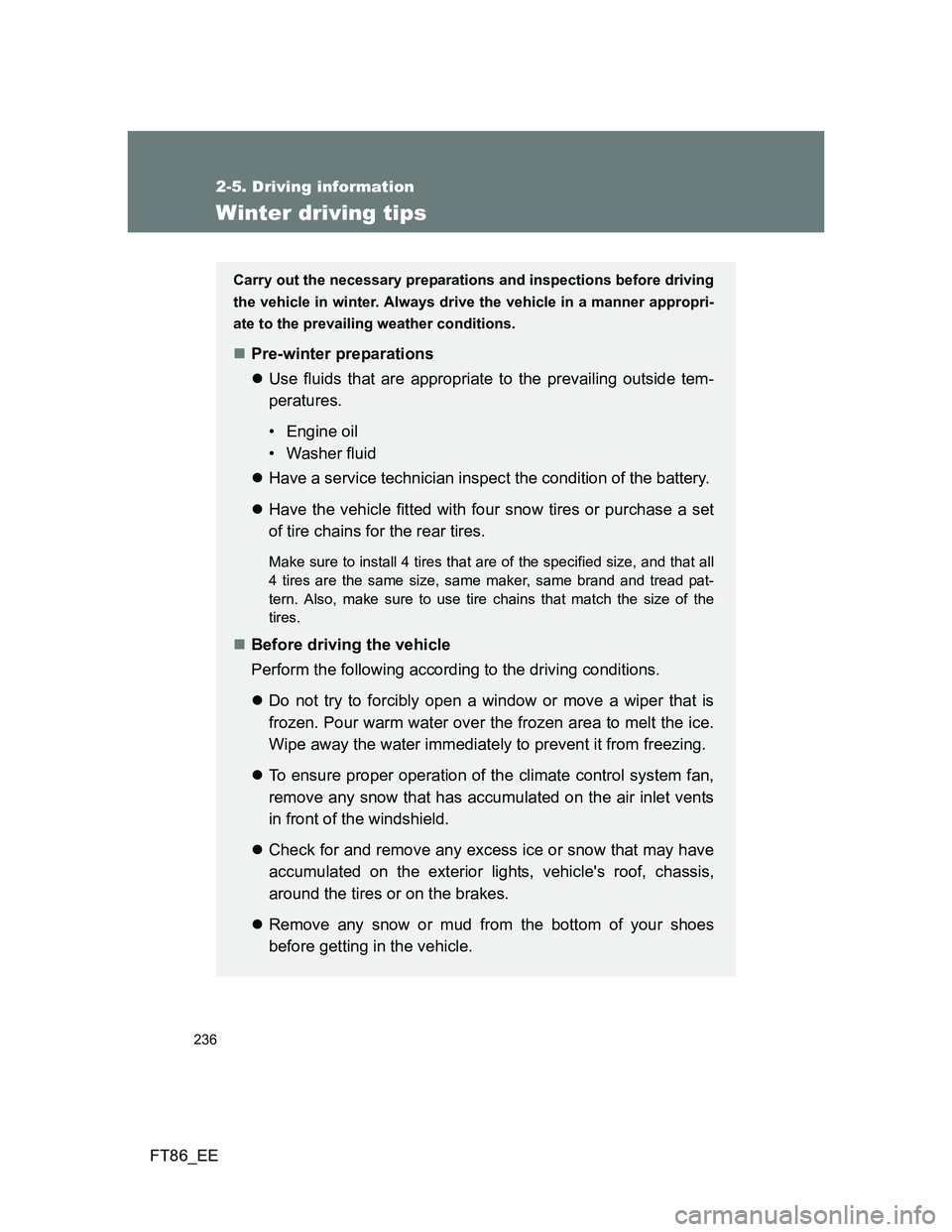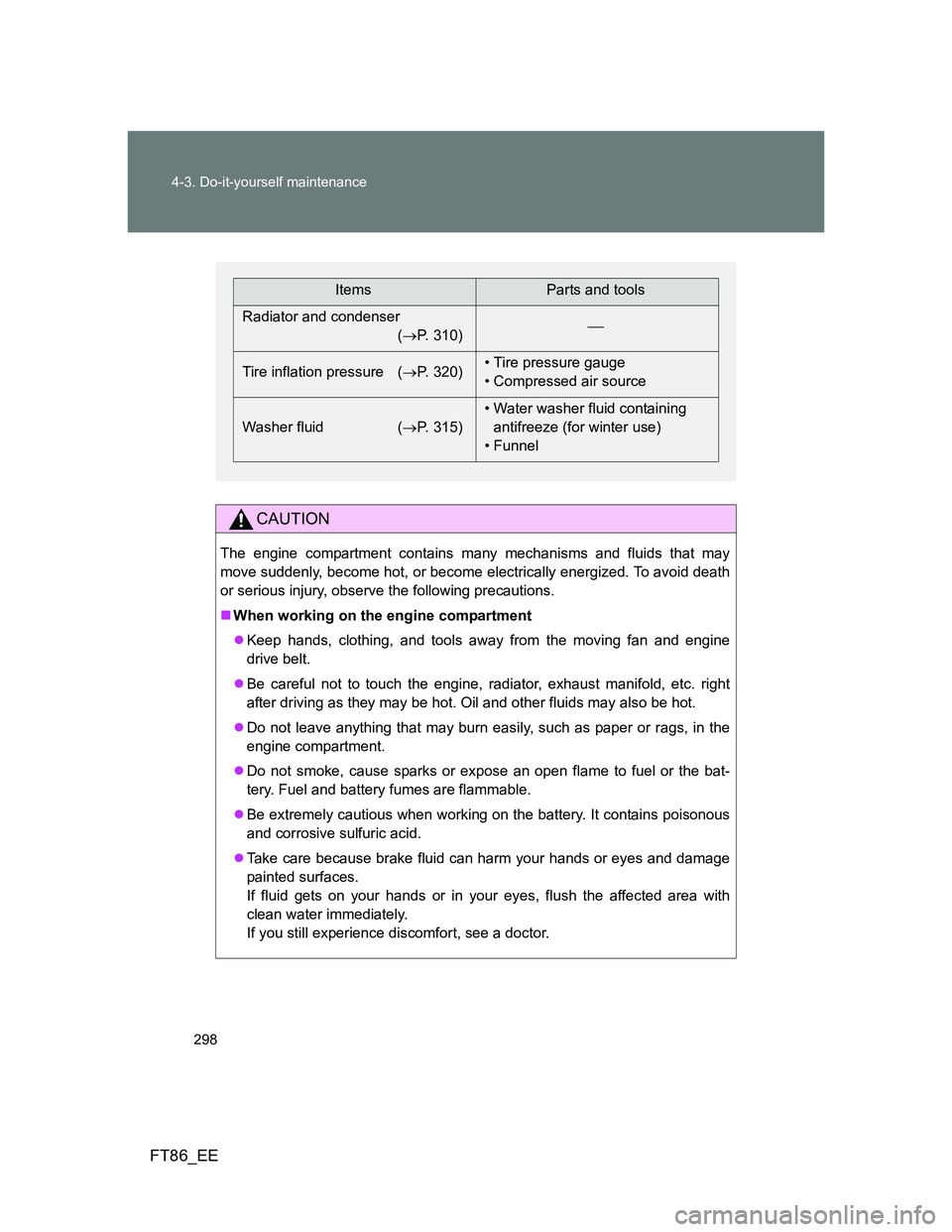Page 221 of 452
221 2-3. Operating the lights and windshield wipers
2
When driving
FT86_EE
The windshield wipers and washer can be operated when
Vehicles without a smart entry & start system
The engine switch is in the “ON” position.
Vehicles with a smart entry & start system
The “ENGINE START STOP” switch is in IGNITION ON mode.
If no windshield washer fluid sprays
Check that the washer nozzles are not blocked if there is washer fluid in the
windshield washer fluid reservoir.
CAUTION
Caution regarding the use of washer fluid
When it is cold, do not use the washer fluid until the windshield becomes
warm. The fluid may freeze on the windshield and cause low visibility. This
may lead to an accident, resulting in death or serious injury.
Washer/wiper dual opera-
tion
The wipers will automatically
operate a couple of times after
the washer squirts.
Vehicles with discharge head-
lights: When the headlights are
on and the lever is pulled and
held, the headlight cleaners
will operate once.
Page 222 of 452
222 2-3. Operating the lights and windshield wipers
FT86_EE
NOTICE
When the windshield is dry
Do not use the wipers, as they may damage the windshield.
When the washer fluid tank is empty
Do not operate the switch continually as the washer fluid pump may over-
heat.
When a nozzle becomes blocked
In this case, contact any authorized Toyota dealer or repairer, or another
duly qualified and equipped professional.
Do not try to clear it with a pin or other object. The nozzle will be damaged.
Page 236 of 452

236
2-5. Driving information
FT86_EE
Winter driving tips
Carry out the necessary preparations and inspections before driving
the vehicle in winter. Always drive the vehicle in a manner appropri-
ate to the prevailing weather conditions.
Pre-winter preparations
Use fluids that are appropriate to the prevailing outside tem-
peratures.
• Engine oil
• Washer fluid
Have a service technician inspect the condition of the battery.
Have the vehicle fitted with four snow tires or purchase a set
of tire chains for the rear tires.
Make sure to install 4 tires that are of the specified size, and that all
4 tires are the same size, same maker, same brand and tread pat-
tern. Also, make sure to use tire chains that match the size of the
tires.
Before driving the vehicle
Perform the following according to the driving conditions.
Do not try to forcibly open a window or move a wiper that is
frozen. Pour warm water over the frozen area to melt the ice.
Wipe away the water immediately to prevent it from freezing.
To ensure proper operation of the climate control system fan,
remove any snow that has accumulated on the air inlet vents
in front of the windshield.
Check for and remove any excess ice or snow that may have
accumulated on the exterior lights, vehicle's roof, chassis,
around the tires or on the brakes.
Remove any snow or mud from the bottom of your shoes
before getting in the vehicle.
Page 298 of 452

298 4-3. Do-it-yourself maintenance
FT86_EE
CAUTION
The engine compartment contains many mechanisms and fluids that may
move suddenly, become hot, or become electrically energized. To avoid death
or serious injury, observe the following precautions.
When working on the engine compartment
Keep hands, clothing, and tools away from the moving fan and engine
drive belt.
Be careful not to touch the engine, radiator, exhaust manifold, etc. right
after driving as they may be hot. Oil and other fluids may also be hot.
Do not leave anything that may burn easily, such as paper or rags, in the
engine compartment.
Do not smoke, cause sparks or expose an open flame to fuel or the bat-
tery. Fuel and battery fumes are flammable.
Be extremely cautious when working on the battery. It contains poisonous
and corrosive sulfuric acid.
Take care because brake fluid can harm your hands or eyes and damage
painted surfaces.
If fluid gets on your hands or in your eyes, flush the affected area with
clean water immediately.
If you still experience discomfort, see a doctor.
ItemsParts and tools
Radiator and condenser
(P. 310)
Tire inflation pressure (P. 320)• Tire pressure gauge
• Compressed air source
Washer fluid (P. 315)• Water washer fluid containing
antifreeze (for winter use)
• Funnel
Page 304 of 452
304
4-3. Do-it-yourself maintenance
FT86_EE
Engine compartment
*: For right-hand drive vehicles: This is located on the opposite side of the
engine compartment.
Battery* (P. 3 1 1 )
Engine oil level dipstick
(P. 305)
Engine oil filler cap
(P. 306)
Washer fluid tank (P. 315)Electric cooling fans
Condenser (if equipped)
(P. 310)
Radiator (P. 310)
Engine coolant reservoir
(P. 308)
Fuse box (P. 330)
Page 315 of 452
315 4-3. Do-it-yourself maintenance
4
Maintenance and care
FT86_EE
Washer fluid
If the washer fluid level is at
“LOW”, add washer fluid.
NOTICE
When recharging the battery
Never recharge the battery while the engine is running. Also, be sure all
accessories are turned off.
When adding distilled water
Avoid overfilling. Water spilled during battery recharging may cause corro-
sion.
Using the gauge
The washer fluid level can be checked by
observing the position of the level on the
liquid-covered holes in the gauge.
If the level falls below the second hole
from the bottom (the “LOW” position),
refill the washer fluid.
CTH43AS134
Current
fluid level
Page 316 of 452
316 4-3. Do-it-yourself maintenance
FT86_EE
CAUTION
When adding washer fluid
Do not add washer fluid when the engine is hot or running, as washer fluid
contains alcohol and may catch fire if spilled on the engine etc.
NOTICE
Washer fluid
Do not use soapy water or engine antifreeze instead of washer fluid.
Doing so may cause streaking on the vehicle’s painted surfaces.
Diluting washer fluid
Dilute washer fluid with water as necessary.
Refer to the freezing temperatures listed on the label of the washer fluid bot-
tle.
Page 444 of 452

444 Alphabetical index
FT86_EE
Engine
Compartment ........................ 304
Engine switch ................ 171, 180
Hood ..................................... 300
How to start the
engine ......................... 171, 180
Identification number............. 423
If the engine will not start ...... 400
Ignition switch ............... 171, 180
Overheating .......................... 414
Engine coolant
Capacity ................................ 429
Checking ............................... 308
Engine coolant temperature
gauge ...................................... 196
Engine immobilizer system ...... 88
Engine oil
Capacity ................................ 426
Checking ............................... 305
Preparing and checking
before winter ....................... 236
Engine switch................... 171, 180
Engine switch light .................. 261
EPS............................................ 228
Event data recorder ................... 22
Floor mat .................................. 277
Fluid
Washer.................................. 315
Fog lights
Replacing light bulbs ............. 338
Switch ................................... 218
Wattage................................. 434
Front fog lights
Replacing light bulbs ............. 338
Switch ................................... 218
Wattage................................. 434Front passenger's seat belt
reminder light ........................ 371
Front position lights
Replacing light bulbs............. 338
Switch ................................... 211
Wattage ................................ 434
Front seats
Adjustment .............................. 61
Front turn signal lights
Replacing light bulbs............. 338
Switch ................................... 193
Wattage ................................ 434
Fuel
Capacity ................................ 425
Fuel gauge ............................ 196
Fuel pump shut off system.... 367
Gas station information ......... 452
Information ............................ 435
Refueling................................. 84
Fuel door .................................... 84
Fuel filler door............................ 84
Fuel pump shut off system ..... 367
Fuses ........................................ 330
Gauges ..................................... 196
Glove box ................................. 264
F
G